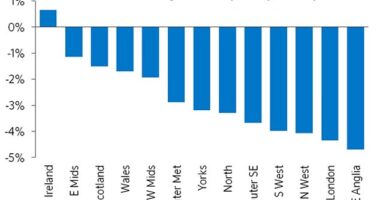THREE quarters of small business owners have had to pass rising costs onto their customers, according to research.
The survey of 500 SMEs revealed 86% are trying to minimise their overheads in an attempt to reduce further increases or keep their prices the same, amid escalating costs.
This includes carefully monitoring their energy bills (33%), shopping around for cheaper suppliers (33%) and putting a freeze on hiring staff (28%).
However, 26% of these small business owners are working unpaid hours to alleviate the financial pressure.
It also emerged fuel, raw materials and gas and electricity bills are the main rising ‘hidden costs’ putting pressure on the end price of their product or service for the consumer.
And 28% struggle with not knowing how much their next energy bill will be.


To keep a closer eye on the intensifying costs, 72% either have a smart meter or are considering getting one to better manage their energy spend.
Unfortunately, 61% who are yet to increase their prices think it is ‘inevitable’ if the current trajectory continues – and 77% fear they will have to hike their prices within the next six months.
But for those who have already had to increase their costs, 85% said it was the ‘last resort’.
And while 44% said their customers have been understanding, 53% have lost some as a result.
Most read in Money
The research was commissioned by Smart Energy GB to mark the launch of Costs, Energy & Going Green, a guide to help small businesses with the current challenges.
Spokesperson Fflur Lawton said: “Small businesses are facing many of the same challenges and price hikes that consumers are.
“And it’s inevitable that increased running costs will be passed on to customers in some instances.
“However, new research has found that many businesses are trying their best to minimise the impact of these price rises on their customers and are going to great lengths to keep their overheads as low as possible.”
The study found small business owners estimate their outgoings have risen by 13% since the start of the year.
While 35% said uncertainty about rising costs is the most challenging thing about running a business – with 92% concerned about intensifying costs for the remainder of 2022.
And 78% believe the rising costs could jeopardise their long-term goals and ambitions for their business.
Working long hours and significant world events – such as the pandemic – also ranked among the leading challenges small businesses are facing.
Nearly seven in 10 (69%) said plans are already being formulated so they can avoid increased prices in the remainder of this year.
Turning off appliances when not in use, reducing the amount of energy used and going paperless are the leading sustainable measures small business owners have taken to cut costs.
While 27% have slashed the amount they are travelling for meetings and continued to embrace video calls.
Fflur Lawton added: “When you are focused on keeping a business running smoothly, anything that helps make the day-to-day challenges a bit easier can be a welcome relief.
“As smart meters securely send data directly to energy suppliers, businesses only ever pay for what they actually use – which can be a great help with cash flow.
“There’s also no need for business owners to do manual meter readings as they’re sent automatically, so getting a smart meter installed can be a great time saver too.”
TOP WAYS SMALL BUSINESSES ARE REDUCING OUTGOINGS
- Keeping a closer track of monthly bills
- Shopping around for different suppliers
- Monitoring energy usage more closely
- Not hiring more staff
- Shopping around for cheaper insurance
- Working unpaid hours
- Not purchasing any new IT software
- Not purchasing any new office equipment
- Not purchasing any new IT hardware
- Reducing marketing budgets
- Fewer company vehicle journeys to reduce fuel costs
- Changing to cheaper raw materials for products
- Encouraging more working from home
- Negotiating reduced rents
- Switching to greener solutions
- Retraining existing staff to avoid hiring someone new
- Introducing stricter rules for staff expenses
- Moving to smaller/cheaper premises
- Outsourcing certain jobs to avoid hiring someone new
- Getting rid of office space
Risks to small business owners during the cost of living crisis have been revealed including paying back Government COVID loans.


We reveal the top ten tips for a successful small business including having social media and a renewable energy provider.
A study has also revealed that people are too frightened to become their own boss.









